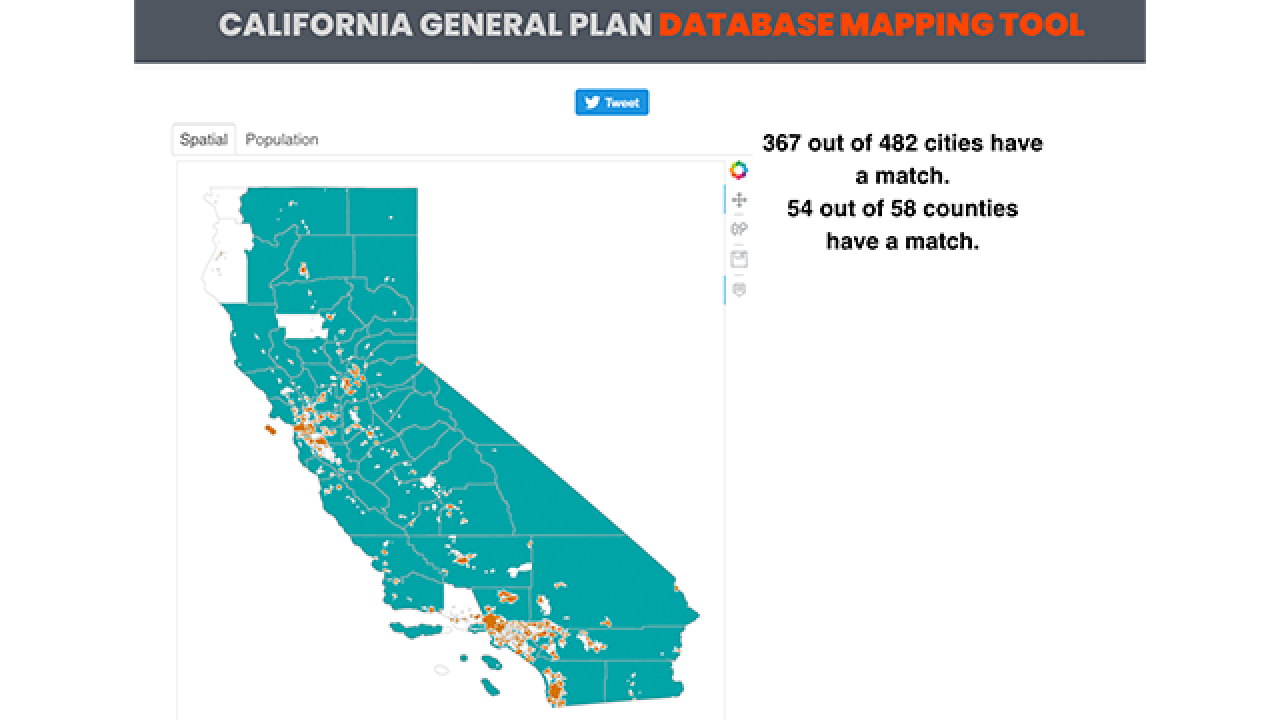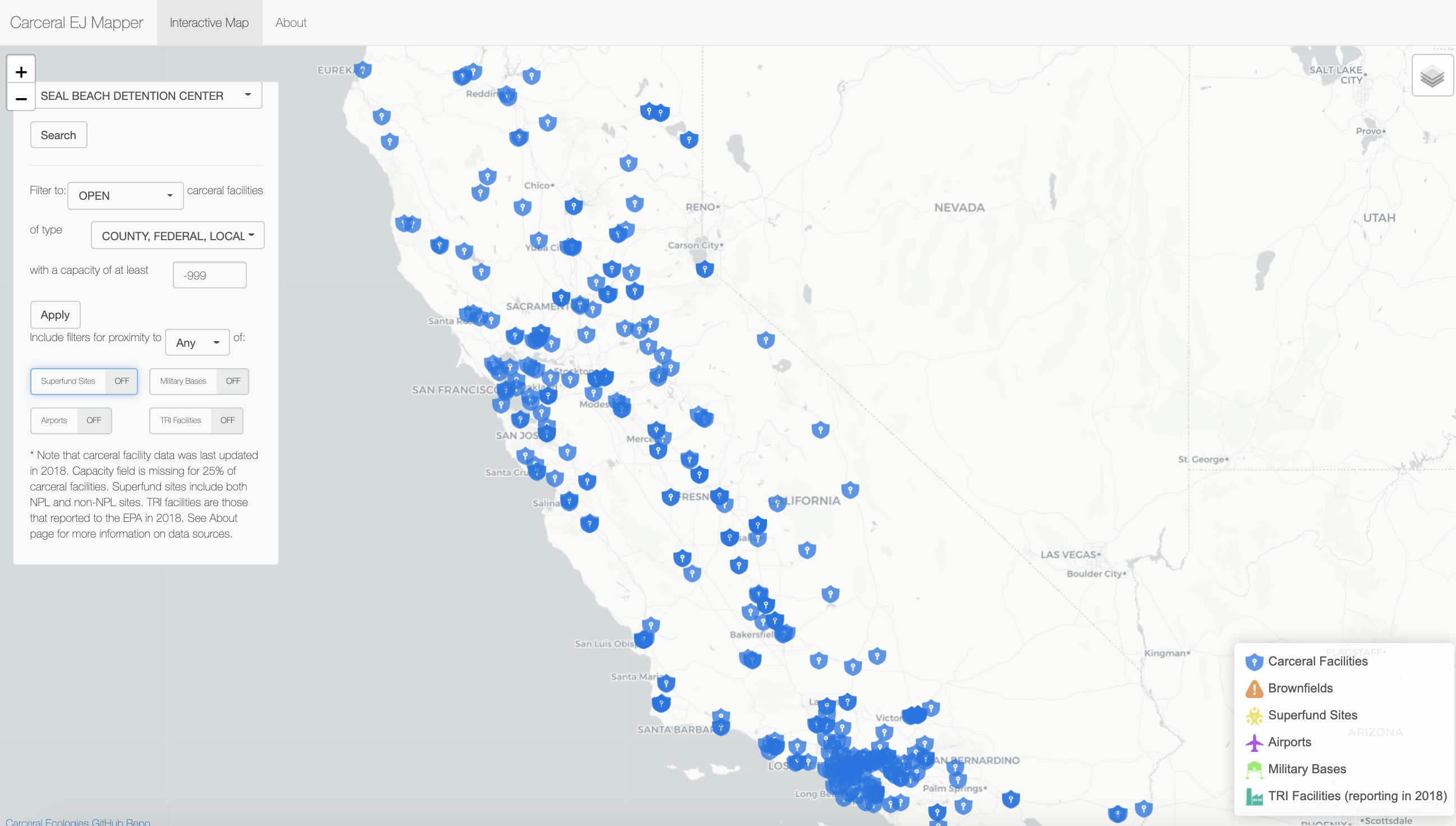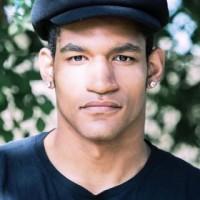
UC Davis Students Engage Public Data and Collaborative Design to Examine Social Disparities in California
By Lindsay Poirier, Assistant Professor, Science and Technology Studies
Since Fall 2019, the UC Davis DataLab has convened a group of graduate students, undergraduate students, staff, alumni, and faculty in a research cluster called Hack for California. The goals of the cluster have been multi-faceted. For one, we intended to carve out a space where civically-minded Aggies could congregate to explore public data and how it could be leveraged to examine social equity issues facing California. Partnering with community organizations and research labs throughout the UC-system, the group sought to assess the availability of open government data for addressing complex problems and to configure that data in ways that could advance understanding of social disparities, while also communicating their stakes.
For instance, partnering with the Carceral Ecologies Lab led by Dr. Nicholas Shapiro at UCLA, we tracked down data that allowed us to examine the proximity of prisons, jails, and detention centers to sites of toxic pollution. Collaborating with students at UCLA, we then built the Carceral EJ Mapper - a mapping tool that researchers, policy-makers, and journalists can use to filter to facilities where inmates are at heightened risk of exposure to pollutants. Partnering with Dr. Catherine Brinkley in the Department of Human Ecology at UC Davis, we co-designed a database that planners and state agencies can use to query the contents of hundreds of California general plans – the primary planning documents for cities and counties across the state. We met every Tuesday night – at first in the UC Davis DataLab and later online – to advance work on such projects.

Yet another goal of the Hack for California cluster was to reflect on public knowledge gaps and evaluate their consequences for California communities. We wanted to examine why it can be so difficult to make certain claims with public data, along with how public data infrastructure can be improved to more readily contextualize the problems that communities most care about. Despite the efforts of dedicated public servants, with limited resources to prioritize basic data management, government data can be riddled with missing values, underdeveloped documentation, and inconsistencies. Often, the most vulnerable populations are undercounted in datasets documenting the most pressing problems in the US. This may be because data collectors face unique challenges in accessing these populations, because communities opt out of data collection for fear of surveillance, or because standardized definitions and categories exclude populations from consideration. Further, scrutinizing the most “wicked” societal problems often requires drawing on data from a number of different sources – sources that bring different definitions and standards to bear in data production, making their integration particularly challenging. We aimed to examine how the social components underlying data could lead to the non-production of certain forms of valuable community knowledge.
When I saw the call for the Community Engaged Learning Faculty Fellows (CELFF) Program, it seemed like a unique opportunity to design a course that could help students approach data analysis work in a more reflective way, enlisting community expertise in the process. I wanted to design a curriculum that would scaffold opportunities for students to collaborate with community groups and other community-engaged researchers in identifying problems warranting public concern, outlining their complex dynamics, and articulating the forms of evidence that could be most impactful for conveying the urgency of the issues at stake. The Community Engaged Learning Faculty Fellows (CELFF) Program convened faculty across campus excited about the promise of community-engaged learning, while also willing to grapple with its unique challenges. The 2020 cohort of fellows met monthly to workshop each other’s courses and navigate the pedagogical, logistical, and ethical intricacies of designing meaningful community-based learning opportunities for students.
As an outcome of the program, undergraduate students participating in Hack for California in Fall 2020 met weekly to workshop components of their projects in preparation for participating in the Tuesday hack meetings. We discussed how to balance expertise with humility in community-engaged work, strategies for interviewing community partners, frameworks for project and task management, and the value of thorough documentation for contextualizing data-based knowledge claims. Students built out public GitHub repositories to host their collaboratively-written code, track project milestones and tasks, and journal about the moments when data quality issues made it impossible to produce certain kinds of claims. A few students share their experience in the program below.
Deckard Barnes (’21, Cognitive Science)

"This past school year I also had the honor of working on the Carceral EJ Mapper project alongside Professor Poirier and Brittany Bates, and in collaboration with the Carceral Ecologies Lab. The project is an online web app built in R that marks carceral facilities that are in close proximity to toxic sites in the United States. It is immensely important to gather data to raise awareness of environmental injustice and build a strong case to disassemble unjust criminal justice systems. I came into the project with some elementary experience in R programming and Python in regards to data analysis. Working on this has exposed me to advanced data manipulation with geospatial data and joining datasets. Additionally, the Hack for CA program gave me confidence to work remotely with a team in the future if need be. All in all, the program was a valuable experience, and I wish to only work on projects with egalitarian motives in my upcoming career."
Brittany Bates (’21, Computer Science)

"I had the opportunity to work on the Carceral EJ Mapper project which is a tool for examining the proximity of carceral facilities in the United States to various environmental hazards. Within a US state, users may apply filter conditions to determine which carceral facilities have a certain number of superfund sites, brownfields, and other sites of toxic pollution within a given proximity to the facility. While working on this project, I was able to interview Dr. Nicholas Shapiro, an environmental researcher at UCLA who studies toxic living conditions. It was through this interview that I learned the magnitude of environmental injustices carceral facilities and incarcerated people are facing. Throughout the course, not only was I able to gain experience working with and analyzing large data sets, the Hack for CA program exposed me to project management and agile methodologies which I will carry with me to industry. Above all, Hack for CA has inspired me to seek out meaningful work that positively impacts society while using data science."
Makenna Harrison (’22, Statistics)
"I worked on the General Plan Affordable Housing project partnering with Dr. Catherine Brinkley, a professor at UC Davis that studies how cities plan for healthy communities. Our team explored the topic of affordable housing by analyzing housing elements within city general plans, gathering open data, and performing other exploratory research. We are currently building an R Shiny dashboard to display open data on topics related to affordable housing. During the project, I learned how housing policy in California is decentralized. Each city has their own unique approach to housing policy and goals established by the Regional Housing Needs Allocation are often not met. As an undergraduate statistics major, I am most accustomed to working with numeric, tabular data. However, at the beginning of this project, I was able to expand my skills to learn more about topic modeling and text analysis. Through my project with Hack4CA, I have a newfound interest in the intersection between data and policy analysis, and hope to explore this more in the future when attending graduate school."
Read More about Hack for California’s Work
All blogs are the personal accounts and opinions of the individual writers and do not necessarily reflect the those of Public Scholarship and Engagement or UC Davis.
